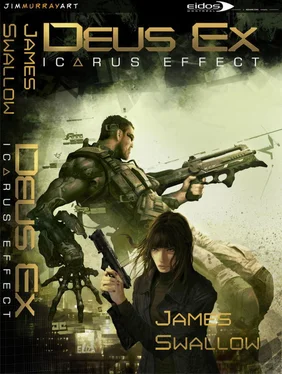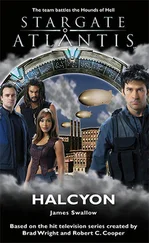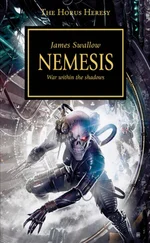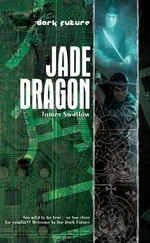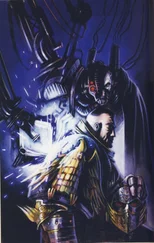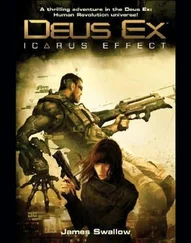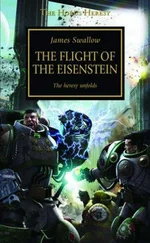Powell had the distracted look of someone using a comm implant. He glanced at Saxon but said nothing.
He nodded at the FR-27 rifle slung over the man’s chest. “Do I get a weapon?”
“I only give guns to people I trust.”
“What are we doing?” Saxon went on. “As cozy as this is, we can’t fly to Switzerland in this thing.”
Powell smiled thinly, reacting to something only he heard. “Don’t sweat it,” he called back. “Our ride is here.” He jerked his thumb at the porthole.
For a moment, Saxon couldn’t see what he was talking about; then his perception caught up with what he was looking at, and the shape he’d thought was just another churn of storm clouds took on a different aspect.
From out of the easterly front emerged a massive, elongated ellipse. Lined with fins and stabilators, great hoops hung from its flanks, the centers of them blurred by the motion of wide, fluted rotor blades. Along the flank of the aircraft he saw a blue-on-blue livery and the name: LEBEDEV AIRCARGO.
“Whoa!” said D-Bar, crowding in to take a look, “Cargo zep… Good cover.” He trailed off as he thought it through. “But… how are we gonna get on board?”
Powell was getting to his feet. “Not the easy way.”
The veetol’s deck dipped and the hull of the airship rose to fill the window. The other men were securing their gear, checking straps and gear pockets. Kelso met Saxon’s gaze with a questioning look and he gave her a shrug as a reply.
D-Bar turned to him, catching on. “He’s not serious—”
A red light flashed and along the side of the veetol, a seam opened to peel back a long drop-hatch. Cold air howled into the cargo space and Saxon felt his gut tighten. He closed his eyes and for a moment he was remembering blackness and the shriek of wind.
The dorsal hull of the airship drifted past below them, a curved stretch of ridged aluminum as wide as a football field. He saw guide rails set into the metal and thick maintenance cables. The veetol dropped, almost bumping into the hull of the cargo carrier as a gust of wind pulled at the wings.
Two of Powell’s men went first, the gale-force airstream catching them. Before Saxon could stop him, Powell went forward and shouldered D-Bar out through the open hatch. The hacker screamed as he fell, but the men on the hull were there to grab him.
Powell turned on Kelso and shouted, “You should stay behind. Go back with the flyer.”
Saxon saw the shift of emotions on her face and she shoved the man out of her way. She dropped from the veetol, a flash of panic on her face—and then she was down and safe, clinging to the guides.
“You next” Powell ordered.
Saxon frowned and made the drop; it was less than a meter and a half of open air, but a sudden burst of wind shear hit him like a punch in the gut. He felt his foot touch the curve of the hull and slip out from under. His balance wasn’t there and he was falling.
Suddenly, slender but strong fingers were gripping his wrist tightly. It gave him the moment he needed, and Saxon’s cyberarm snagged a cable and held fast. He turned his head to see Kelso holding him steady with no little effort.
Saxon nodded his thanks and scrambled back up the curve of the hull. Powell and the last of his men dropped to the deck as the veetol curved away, and he led them forward to a windbreak and a hatch set flush with the hull. D-Bar barged his way to the front and made sure he was first in. The rest of them followed suit. The hatch slammed shut as he dropped into the airship’s maintenance bay, cutting out the roaring cold. He frowned; his face was raw with windburn.
“You okay?” Kelso asked.
He nodded and gestured to his cyberlegs. “It’s these new pins. Still working out the gyro synch. Thanks for the assist, though. Hope you didn’t strain anything.”
“It was just reflex,” she snapped, suddenly terse.
“One suh-skydive without a chute is enough f-for anyone,” said D-Bar, fighting back the shivers.
“Can’t argue with you there,” Saxon replied, with feeling.
“Okay, listen up,” Powell ordered. “The zep crew know the drill. They don’t ask, we don’t tell. The ship’ll make a speed-run over the Greenland-Iceland-UK gap and then on down to Switzerland.” He looked at them all in turn. “We need to be ready to go the moment we reach Geneva, so I advise you all to get some rest, because the moment we touch down, we don’t stop until the Tyrants are dealt with, you read me?”
The other men gave a chorus of nods, and Saxon glanced at D-Bar. The young hacker was quivering and wiping tears from his ruddy face. “Wow,” he managed, crack-throated, “that was some rush, huh?”
“Get below,” said Powell, cutting off any reply.
Geneva International Airport—Grand-Saconnex—Switzerland
It was late evening, and a light drizzle was falling in desultory waves across the gray runway and the aircraft apron. Namir listened to the rattle of the raindrops off the apex of the open hangar cowling overhead; the wide, low metal shed was dimly lit so as not to draw attention from the civilian traffic passing only a few hundred meters from the nose cone of the Tyrant aircraft parked within. Once again, the jet’s livery had been reprogrammed and reconfigured to conceal its true nature. Currently it wore the black and gold of the private military contractor Belltower. The PMC had a long-standing relationship with the Swiss government that proved a useful cover for the Tyrants. They would be left to their own devices.
Namir walked the length of the aircraft, casting a glance across the darkened hangar to where Hermann and Barrett were working at the back of an unmarked commercial van. The ruin of the German’s right eye was hidden under an adhesive patch, but he showed no signs of suffering for the injury. Namir didn’t intervene; they knew their jobs, and after the recent incident on board the plane, they knew better than to do anything that might be considered a further failure of their duties. He reached the jet’s cargo hatch and halted, studying the door. The seal was undamaged, but there were clear signs of surface damage around the hinges and opening mechanism. It had never been designed to be operated while airborne.
He sensed someone approaching and turned. Federova walked toward him, folding down a hood from her dark hair, flicking rain from her shoulders. Her expression was unreadable, but Namir knew her well enough to see the irritation lurking there. She didn’t enjoy the surveillance operations; she liked the hunt and the kill better than the stalking. “You’re late,” he said.
She looked up and saw the same scarring on the hull, and cast a questioning look at him. He smiled slightly. Yelena loved the sound of her own silence; sometimes it seemed as if he had never known her to speak at all.
“It’s nothing of concern,” he noted. “I’m afraid Ben Saxon made a decision to part company with us. He chose the time and place rather poorly.”
Her eyes narrowed and she made a throat-cutting gesture.
“Likely.” He held out a hand, changing the subject. “So. Give it to me.”
Federova produced a small digital slate from her pocket and handed it over. Namir tapped the screen and scrolled through the images in the memory. The display was full of shots of the Metropol Grande, one of the more opulent of Geneva’s great hotels. The footage highlighted locations for monitor cameras and security posts around the front entrance and throughout the underground garage beneath the building; others showed corridors on the executive penthouse level, accessways, and the like. The last image was at an angle, a surreptitious shot captured in a moment of opportunity. In the frame was an older man flanked by a coterie of bodyguards and personal assistants. The profile of William Taggart’s face was unmistakable. He scanned the other people in the frame, measuring them against himself, looking for anything that could be a threat. Some of the faces he was already familiar with from the files that Temple had supplied to the Tyrants; there was Isaias Sandoval, the Humanity Front’s right-hand man and chief of staff alongside Taggart’s personal assistant Elaine Peller, and a few others. Not one of them possessed even the most basic of augmentations. Namir wasn’t foolish enough to believe that his implants made him invulnerable, but they did make him superior. Quite how these people believed they could ever hope to protect themselves from the threats of this world—threats like the Tyrants—was beyond him.
Читать дальше
